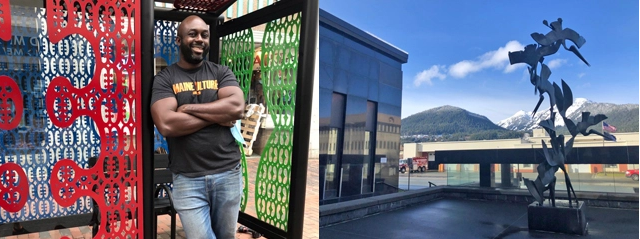Editor's note: This is the second semi-finals bout in our contest to find America's Best Bus Stop. Don't forget to scroll to the bottom to vote, and click back to our first semifinals bout, Boston vs. Lewes, before polls close on Sunday.
Smaller bus systems may not get as much attention as big city transit meccas, but a lot of them punch way above their weight class — especially when it comes to their waiting areas.
Today, we're looking at two small-city stops that stole voters' hearts in round one. But only one can represent the little guys in the championship.
Let's take a look.
Portland, Maine
In round one, this work of bus stop art clinched 54 percent of the vote and the victory, beating out beloved stops in Baltimore and Norwalk, Conn. It should be noted that it also has the highest vote total of any entrant in this contest so far, which means this one's got some juice if it advances to the finals — and it's no wonder, considering the wonderful story behind this stop.
As we learned earlier in the contest, local jewelry artist and Ghana native Ebenezer Akakpo designed this stop as part of a Creative Bus Shelter initiative that paid creatives $4,500 each to give stops a neighborhood-specific refresh, using funds from the National Endowment for the Arts along with cash and support from local businesses, who donated cash and even the powder-coated metal of which this stop itself is made.
Akakpo's design celebrates his own background as well as the diversity of the larger immigrant community of Portland, whose public school system enrolls students speaking 63 different languages — an astounding number for a city of just 66,000 people, or about 10 percent of the population of that other Portland.
Juneau
Our second semifinals contender has a little public art of its own, though we didn't get a good look at it in round one. (In our defense, we were a little distracted by that epic mountain view.) And it's also deeply connected its region's diverse history and culture...even if the pelicans featured in this sculpture aren't, considering that Alaska doesn't have any live ones.
"Juneau is on Lingít Aaní, land that through history has been lived in and cared for by Southeast Alaskan Native communities," said nominator Becca Freer. "This bus stop straddles lines: between the natural and built environments and between cultures. One of Juneau’s main transit hubs, this stop serves a majority of bus lines in town and is located at the base of the Hurff A. Saunders Federal Building, a mid-century emblem of colonialism."
That painful colonial legacy is still felt in Juneau today, the majority of whose 32,000 present-day residents speak English rather than the Lingít language. But Freer says meaningful but simple investments, like benches and thoughtful public art serve as a small but potent gesture of care, dignity, beauty, and intention to heal the wounds inflicted on indigenous communities. The black marble shelter that protects the stop is particularly appreciated, since Juneau gets more than 300 days of precipitation a year.
"Reliable, convenient, and safe public transit is one of the greatest tools to foster equitable communities and realize mobility justice," Freer added. "In a city that is the second largest in the country by area, and holds an absence of an externally-connecting road network, transportation concerns are paramount...We may not always get public investment right in this country, but we can’t stop trying."
We couldn't agree more — and we can't wait to see whether this stop lands in the finals.
Let's vote: which stop should advance to the championship bout? Polls close on Tuesday, April 5 at 11:59 p.m. ET.
[poll id="209"]
Here's the bracket if you're following along at home:






